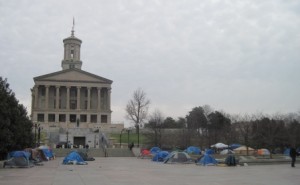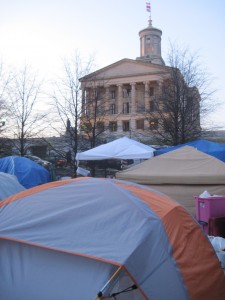Occupying Home: 24 Hours with Occupy Nashville
When I show up at the Occupy Nashville camp around 3 p.m. on February 9th, the cold gray expanse of Legislative Plaza resembling a frozen lake, I look like I have enough equipment to be hitching cross-country. Compact tent in one hand, small backpack in the other with a couple of peanut butter sandwiches, granola bars, lantern, journal, Hot Hands packets and notebook, the bulk of my load is simply a large sleeping bag and pillow shoved into my husband’s interior frame backpack and two thin foam pads rolled into a not-so-compact roll which I hope will keep me far enough away from that frigid granite to actually get some sleep tonight.
The plaza has about 20 tents on the right side lining the large square fountain now empty of water, perhaps 10 on the other side. There are a few people standing outside and I make my way to a white pavilion in the corner near the Capitol building where distribution of warm food has drawn some Occupiers together. I introduce myself to a youngish guy with black hair and ear gages. “I’m Matt,” he says, with a demeanor not unfriendly but of one who has more important matters to which to attend. “Jason told me to watch for you.” I ask if it matters where I pitch a tent and he points out a spot near the food pavillion that looks like it’s been recently vacated; some old cardboard and a pile of dead leaves flank one side and on the other side a seemingly abandoned pup tent with its door sagging open. Thankfully this camping spot has a buffer of three or four tents between it and the left side of the Plaza, which has a seedier, less-purposeful look about; the proverbial wrong side of the tracks.
Matt also tells me he’s on the media team and helps with security, and that sometimes there is the need to self-police and remove people from the Plaza at night who are drunk and violent. “If you hear any commotion in the middle of the night, just stay in your tent and you should be okay,” he tells me. After that he points to a small tent in front of the food pavilion, caddy corner to my own. “That’s Anthony. If you need any help, he’s there.” Though wary of just what might happen in the middle of the night that might warrant me needing Anthony, at least I now have a name to scream.
I set up my tent on a surface impossibly smooth, then put a little flyer on the Occupy bulletin board near the Plaza steps to Union Street and TPAC. It tells people what I’m doing, where my tent is located and invites them to come by and tell me their story. I sit out on the low granite ledge in front of my tent that encloses some small trees and landscaping, open for business. Soon a gentleman in a brown cowboy hat, brown jacket and a cane walks up. He introduces himself as Tom Sweet, and tells me he’s been here for a couple of weeks since he lost his townhouse. He shares his spheel about bank bailouts and corruption in government, and after a few minutes tells me if I need anything, he’s in the tent with the green lining and all the signs out front. Another name to call out if there is a raging violent drunk with a broken bottle who tries to slash me and my tent in the middle of the night. I can tell people are concerned about my feeling safe, and that makes me both comforted and cautious as I settle into my 24-hour new home.
The Ethics of Homelessness
Had I left after an hour, I would have seen practically nothing, had only surface conversations, never met so many people who joined me on the stone ledge to sit and tell me about life on the Plaza.
But there I was, wondering those first couple of hours if this was going to work, if anyone would actually be interested in talking to me. And just when I think I might not get more than a few casual introductions, a man with a kind, knowing smile framed by a short beard and gray hair curling out from his skull cap walks up, sits next to me, crossing his legs and leaning back with a casual air and says, “Now let me ask you this. You see that man sitting over there on the corner, with the sleeping bag over his head? He’s been there for hours. He’s defecated on himself. It’s run down his pants. He won’t accept any help or food. What do you think we should do? Should we call the police? Have him taken in for 72 hours and observed for mental illness and get him cleaned and clothed? What do you think?”
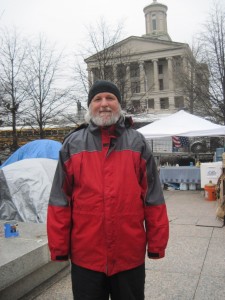 And so starts my conversation with Judah, an Occupier from Miami who is intelligent, friendly and informed, but whose religious views can at times throw an irrational monkey wrench into an otherwise engaging conversation. We discuss the pros and cons of the man being taken into temporary custody against his will — Judah obviously concerned about the man’s situation –and the details and ethics of Florida’s Baker Law. Judah is homeless and pitches his tent in the portico of War Memorial. He’s been here five months.
And so starts my conversation with Judah, an Occupier from Miami who is intelligent, friendly and informed, but whose religious views can at times throw an irrational monkey wrench into an otherwise engaging conversation. We discuss the pros and cons of the man being taken into temporary custody against his will — Judah obviously concerned about the man’s situation –and the details and ethics of Florida’s Baker Law. Judah is homeless and pitches his tent in the portico of War Memorial. He’s been here five months.
By the time Judah leaves the ledge, the sunlight is beginning to fade just the slightest bit. Holy shit it’s cold, even before sundown! How do people survive out here? The expected low tonight is 29 degrees. It’s one thing to spend one night. If I can’t sleep, shivering in my tent, at least I know I’ll be in my warm, comfy bed the next night. But what of the people who have nowhere else to go? And what about the rain, the snow, the winter winds that bite into one’s skin? What about those who are here for a cause and actually chose to live here rather than in their home, protected from the elements and the raging drunks?
A Guided Tour
Night falls and with it the temperature and I can feel my toes and fingers getting a little numb. I have a moment of panic thinking I’d forgotten to pack the Hot Hands packets and wonder if I’ll get frostbite on my fingers and toes. The lights from the nearby Hermitage Hotel glow warmly, luxuriantly. Snippets of conversation float across the frozen granite lake of the plaza. There are some younger Occupiers who randomly make bird noises, or yell out profanities. A couple of men walk by in the dark, and then my next door neighbor shows up and gets in what looked like the abandoned tent. He looks edgy. And not in the hipster East Nashville way, but maybe on the cusp of crazy or dangerous. Several people out here have that look, but then, it’s not easy living on the street ~ even with a cause.
Soon I meet Clay, who comes over and introduces himself. He is an Occupier who stayed from the second day of the Occupation until October 28th, when the wave of mass arrests took place in the government’s first major attempt to disburse the encampment. Now, like many, Clay Occupies part-time rather than in a 24/7 presence because he cannot risk arrest. His hollowed cheeks, accented by shadows cast by the subtle lighting on the Plaza, and deep-set eyes give the look of a life lived. There is something about his thoughtful gaze that reminds me of a vintage photo of Chet Atkins strikingly deep in thought.
Clay gives me a tour of the camp, walking with me down “logistics row.” This is near my tent, where the food pavilion, medical storage and food storage is, and where a few official Occupy Nashville people – those with laminated badges – camp and keep an eye on things. Then we go to “media row”, perpendicular to “logistics row”, and enter the large media tent. At one time, when there was access to power, this tent held laptops and broadcasting equipment. Inside is a 6-foot white table laden with books, but that’s about all that remains. “It has been fractious,” Clay admits, pointing out where someone had spray painted “Power Struggle” in silver over the length of the media tent and chuckling a little. He speaks of Occupy’s purpose. “We’re not here to give answers. We’re here to inspire people to ask questions.”
Mic Check
In the cloak of night, I speak to others. Charles, a young man with an angelic face and dark curly hair who has been there since October, emerges from the darkness, smiles and says hello. We talk about the movement and travel and road trips. He asks about where I’ve been, remarks that he wants to see more of the country, and then asks what age I think he is. My guess is in the mid twenties. He’s 18. And homeless, but it seems more of an adventure for him than a deep hardship at the moment. And he is devoted to the cause. He speaks of the empowerment the movement has given to the homeless community who also call Legislative Plaza home.
“Occupy has strengthened the homeless community and brought us together,” he noted, speaking of the blurred lines between the chronically homeless and Occupiers on the Plaza.
Soon, someone calls out “mic check,” the iconic gathering cry of Occupy, and we all repeat “mic check” back. It is announced that the GA will begin momentarily on the Plaza steps. This repeating of what people say not only ensures that people are listening and understanding, but it also serves as an amplifier which needs no equipment or power other than the voices of many.
As I’m preparing to head toward the steps, Tom Sweet returns with a man in work boots, a yellow “Ironworkers of America” hoodie and a camouflage fishing hat. He introduces himself as Joe, welcomes me to the camp and tells me I will be looked after. I ask if they are going to the GA and they say no, replying that many of those who run the GAs are not true Occupiers. We speak of the cold and I assure Tom and Joe I have a warm sleeping bag. Just before I head to the GA, Joe slips me a “Hot Hands” packet. I tell him I’m fairly sure I have some in my backpack and doesn’t he need to keep this for himself, but he merely smiles, tips his hat in a sign of respect, and heads off. I open the packet and shove them into by boots at the tips of my already freezing toes, zip up my tent and head to the steps.
GAs, or General Assemblies, are definitely a place to get an idea of the official side of the Occupy Movement. Just before we begin a young woman who is moderating the GA asks if I would like to give the welcoming or the closing remarks. I offer to do a closing, thinking it hypocritical or at the very least awkward for me, as a total newcomer, to welcome people who have been attending these for months. Another moderator is Ben, whose red beard and boyish smile is framed by a warm hat and black scarf, breath condensing as he speaks.
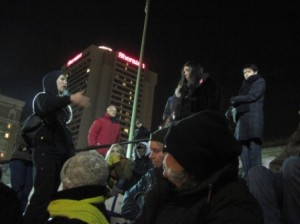 The process of GAs is actually a rather impressive structure for expressing opinions ~ whether popular or not ~ offering “friendly amendments” to proposals which do not have a group consensus, and allowing clarifying questions, discussion and debate. At this GA, because it is one of the coldest nights of the year thus far, it is proposed that we try to wrap up by 8:30 p.m., having started just after 7. The big topic is what to do when and if the proposed new law, essentially criminalizing camping on state property without a permit and resulting in a maximum of 11 months, 29 days in jail and a $2500 fine, goes into effect as early as one week from tonight. Other potential encampment areas are discussed, as well as the possibility of asking the Mayor’s permission to camp on city property. “But that’s not civil disobedience,” Judah responds with a smile. No clear plan emerges, but a lawyer, Tripp, takes some time to council Occupiers on the potential penalties faced for not only camping, but perhaps for even just being in the area when police come to make arrests. He and another woman from Occupy’s Legal Team tell the crowd of about 30 there are lawyers willing to represent them pro bono because they believe in this cause and feel the proposed law is unfair.
The process of GAs is actually a rather impressive structure for expressing opinions ~ whether popular or not ~ offering “friendly amendments” to proposals which do not have a group consensus, and allowing clarifying questions, discussion and debate. At this GA, because it is one of the coldest nights of the year thus far, it is proposed that we try to wrap up by 8:30 p.m., having started just after 7. The big topic is what to do when and if the proposed new law, essentially criminalizing camping on state property without a permit and resulting in a maximum of 11 months, 29 days in jail and a $2500 fine, goes into effect as early as one week from tonight. Other potential encampment areas are discussed, as well as the possibility of asking the Mayor’s permission to camp on city property. “But that’s not civil disobedience,” Judah responds with a smile. No clear plan emerges, but a lawyer, Tripp, takes some time to council Occupiers on the potential penalties faced for not only camping, but perhaps for even just being in the area when police come to make arrests. He and another woman from Occupy’s Legal Team tell the crowd of about 30 there are lawyers willing to represent them pro bono because they believe in this cause and feel the proposed law is unfair.
At one point, an older African-American gentleman asks to speak. He introduces himself as Cecil, tells us he is homeless and decided to come to a GA to hear what we have to say. “We have to have solidarity,” he urges. “I’ve been homeless for 20 years and I’ve watched the situation, the economy deteriorate. Thank you for doing something.”
As the GA wraps up and I am asked to give the closing remarks, I stand up before the gathering and thank them for doing this. I explain that as a mother and teaching artist, it is not possible for me to be here, camping on the Plaza, without a huge disruption to my family and work life. They stand in my stead and hundreds of others who cannot Occupy 24/7. I hang out after the meeting officially ends and there is an open discussion about what to do, and I wonder what happens to a cause like this once their home, their community, is scattered. Could it possibly live on without the tents?
Night Patrol
It is close to 10 p.m. when I return to my tent and the bitter cold informs my decision to call it an early night and slip into my new sleeping bag, which claims to be “comfortable from 10-30 degrees.” That seems impossible at this moment, with fingers so cold I can barely remove my contacts. I thankfully unearth my Hot Hands pockets and shove a couple into the palms of my gloves in which I will sleep, and another pair into my socks. The glow of lantern through the tent wall must show I’m not yet asleep, and I hear what is becoming a familiar voice call my name. “Amanda, are you okay?” calls Tom from outside my tent. “Yes, thank you!” I reply, then hear the tap, tapping of his cane as he walks on.
The sleeping bag is indeed warm, and I don’t freeze at all as long as I keep my hat on and my face tucked under the covers. But it is not a completely restful night. I hear some loud noises from time to time and little yelling, and I sleep the easily-awakened sleep of a new mom. Several times throughout the night I hear the soft tap, tap of Tom and his cane making the rounds of the camp, and the thought that he and others are out there on watch is a deep comfort.
Beauty and Hardship
Morning dawns, and I emerge from my tent to a very quiet and still camp, juxtaposed against the bustle of rush hour traffic on Charlotte and Union Streets. It is surreal awakening on the sidewalk in the heart one’s downtown, a place I associate with work and culture but certainly not camping. Sitting on the granite ledge again with the cushion of my sleeping pad between me and the cold stone, I see why regular campers might forego the peace and beauty of this frigid morning for the warmth of their tents, where there is a chance body heat can be maximized.
I sit with my journal and notebook, taking advantage of the solitude as a few people begin to stir. A woman about my age with steely blue eyes and brown hair pulled back in a ponytail from her strong forehead smiles as she walks past me toward the food pavilion. She comes back carrying a cupcake. “Cupcakes and Pop Tarts for breakfast!” she exclaims, perhaps a little miffed by such a sugary selection but grateful for the food. She walks past, then comes by again. I invite her to sit with me and ask if she can tell me a little of her life on the Plaza, and thus begins an hour-long story.
“It’s hard,” she begins, sitting next to me and shaking her head. “There’s nights when it’s dangerous. The hardest thing about all of this is worrying about my husband, if he’s going to be warm enough and have enough to eat.” She and her husband live on the “other” side of the Plaza, and she fluctuates between using “them” and “us” when referring to the Occupiers. I call her Karen because she doesn’t want to leave her real name due to a child custody issue; her two children live with their grandmothers.
Karen works at a local Mexican restaurant making minimum wage and putting in as many hours as she can. She gets up from her tent home, showers when she can at a local shelter, and walks to work. It is nearly impossible to find a shelter which will take both her and her husband – almost all separate the sexes and those which take couples are full – and her minimum wage job with unstable hours doesn’t pay enough to rent an apartment. Her husband is looking for work, but even day labor jobs are hard to come by, with dozens of men standing in line for hours just for the chance to work for one day. She calls the Plaza “a safe haven when looking for work”, a place where, at least for now, you don’t have to worry about getting arrested for living.
While we’re talking, people begin to move around. A couple of men come by, and one says to the other, “See, I told you about her eyes.” They ask Karen if she’s seen “Donkey” around. She tells them he was arrested a few days ago. “Well, thanks for the eyes,” one says as they leave. Out here one has to soak in beauty whenever and wherever it is found.
When asked what it feels like to live here in the winter Karen says “it’s harsh but interesting. People like me who are just struggling to survive; we have to fight to just get looked at. You have to be beaten or arrested just to get noticed.”
Standing on the Wall
By the time Karen leaves to get ready for work, the sun has begun to warm the Plaza and people are emerging from their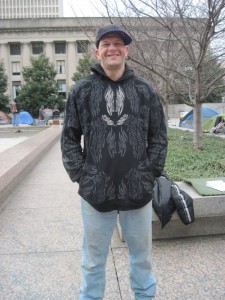 tents. I speak to several people now. Brad, a man in his 30s who is three months sober and involved in a daily program for addiction and chronic homelessness, tells me of his plans to marry. His fiancée, a 17-year-old Sudanese woman, is pregnant with twins. She sits with me for a while and spins outlandish tales about her life, seemingly happy in the façade she creates for herself. They are living in a large tent wrapped in tarps held together by duct tape that is at the end of the Occupy line.
tents. I speak to several people now. Brad, a man in his 30s who is three months sober and involved in a daily program for addiction and chronic homelessness, tells me of his plans to marry. His fiancée, a 17-year-old Sudanese woman, is pregnant with twins. She sits with me for a while and spins outlandish tales about her life, seemingly happy in the façade she creates for herself. They are living in a large tent wrapped in tarps held together by duct tape that is at the end of the Occupy line.
Joe, aka “Gunny” returns, and we talk at length. He tells me he served 18 years as a Marine, and toured in Iraq and Afghanistan. He is originally from Nashville, spent a couple of years wandering around the country after his military duty was over, and is currently fighting for veteran’s benefits which are tied up in red tape. But he’s also actively seeking work.
“I can’t even get a job at McDonald’s because when I sit down for an interview and say I’ve been in the Marines for 18 years, they know I don’t want to take orders from a 17-year-old kid,” he remarks. But he is not disheartened yet. “I’m not like a lot of people here who want a hand out,” he explains with a wry smile. “I want a hand up. I get online every day and check my job applications. I’m persistent.”
Joe is committed to certain Occupy ideals, but more concerned about the loss of civil liberties than bank bailouts. He speaks of limitation of free speech, of government cameras in too many places, of invasion of privacy, of the challenges of the homeless.
“The reason why we are here is for your rights, and the rights of that homeless man over there,” he tells me. “I’ve fought for this country and we should have better freedoms than we do here,” he relates. “We should have a better safety net.” He has a tangible yet quiet sense of pride, particularly when it comes to his military service.
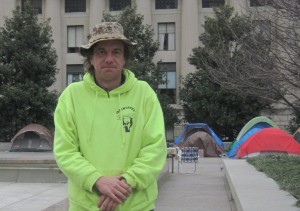 “After what we did – to come down here and get shoved around is disheartening,” Joe relates. There is something about his demeanor that exudes a sense of honor and need to protect. He tells me of some dangerous situations which have happened on the Plaza among those not considered a part of Occupy, adding that things have calmed down considerably. “Three days ago, I would have never left your side while you were here.”
“After what we did – to come down here and get shoved around is disheartening,” Joe relates. There is something about his demeanor that exudes a sense of honor and need to protect. He tells me of some dangerous situations which have happened on the Plaza among those not considered a part of Occupy, adding that things have calmed down considerably. “Three days ago, I would have never left your side while you were here.”
We speak of the pending eviction, and at that point Joe seems committed to stick it out. “I was willing to die for this country. I am willing to go to jail for a cause” he tells me. When asked if he thinks it will make a difference his reply is “Rosa Parks made a difference. Martin Luther King made a difference. Everybody can make a difference.”
Tent City with a Cause
By the afternoon I have spoken to a dozen or more people, skipping the official Occupy event of protesting in front of a hotel hosting a banker’s convention and opting to simply engage in long conversations. Some are official Occupiers, some like Joe are in the Occupy camp and there for the cause but not wholly committed to the official Occupy stand, and some who are simply homeless and find themselves in this community.
Fox, an African-American man with a kind smile, is a former full-time Occupier. He has since gone home to his girlfriend and daughter, leaving three tents behind for whomever needs them. He appreciates those who are able to stay full-time.
“It makes a bold statement to be here,” he relates, noting, like others, the merging of many of the homeless and Occupiers. “I think some of the homeless have converted to Occupy. This is Tent City with a cause.”
Living in the Moment
Mid afternoon brings gray skies and the threat of snow. I join Tom Sweet under the food pavilion, and as we sit in the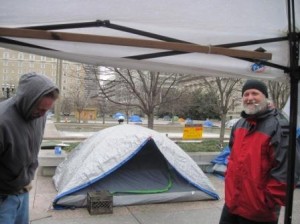 quad chairs looking over the full stretch of the Plaza and visit with Judah and others who come by, he tells me the story of his life.
quad chairs looking over the full stretch of the Plaza and visit with Judah and others who come by, he tells me the story of his life.
Many years ago, he lived in Coconut Grove, Florida, owned a 50-foot Catamaran in which he lived with his wife Mary and two kids and made his living as a fisherman. “There’s no better life, as far as I’m concerned, than working and living on the water” Tom explains in his rugged voice that has the hint of charming Southern drawl. But that dream fell apart in the 1970s when flotillas of drug runners from Cuba became prevalent and the risk of running into armed criminals at work or even at home prompted Tom to sell his boats and move to St. Augustine.
In 1999 his wife died of cancer. “After that, I lost myself for three years in bottles of Jack Daniels,” Tom admits. But he eventually pulled himself together, quit drinking and rebuilt a life without his beloved wife. On February 14, 2011 while working temporarily in Montana helping a friend take care of her horses, he suffered a major stroke which landed him in the hospital for eight days. Doctors were not hopeful about his ability to regain speech and mobility, but he has done miraculously well. However, the stroke ravaged parts of his body. His left foot is numb, as well as two fingers and portions of his left arm. This condition has made it difficult to do work such as carpentry and other manual labor he was once able to do, and he has yet to be able to secure any social security disability benefits.
In January of 2012, back in Nashville, he lost his townhouse because he had been unable to find work. Homeless and jobless, he found a home and a community with Occupy Nashville. Both Tom’s children are grown and have lives of their own in Florida and Texas. For now, Tom is content to fight for a cause he believes in while searching for a more stable life for himself.
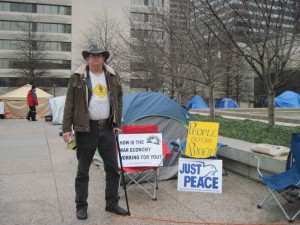 “I live for the day,” Tom says. “Yesterday is gone. There’s no guarantee for tomorrow. As for the future, I have no clue. There is too much government, too much corporation in government, too much lobbying and corruption.”
“I live for the day,” Tom says. “Yesterday is gone. There’s no guarantee for tomorrow. As for the future, I have no clue. There is too much government, too much corporation in government, too much lobbying and corruption.”
While we are talking, a couple of young women wander up to the food pavillion. One has bright yellow and purple hair, both have quite a few piercings, and they are both under age 20. They tell us they’re from Occupy Charlottesville which has now been cleared, homeless unless you count the car one of them owns, and are wandering around the country. They seemed surprised not to find more action in the camp, giving the impression that the average age of Charlottesville Occupiers is significantly lower than Nashville’s. One of the girls says she can’t wait for the revolution to come. She’s going to get a gun and blow people away. Tom tells her that is not the answer.
“If you can occupy your heart, you can occupy the world,” he says. “Everything you do should be out of love. Love the one percent.”
These two girls are the type who give some validity to the unfortunate stereotype that Occupiers are just young kids there for the party. One can sense the suppressed collective head shaking of Tom, Judah, myself and Chris, another Occupier who has joined us, who are older and hopefully far wiser.
My time with Occupy is coming to an end. Joe offers to help me pack up my tent and I cram everything I can into the backpacks just as a light snow begins to fall. Colder nights are ahead, and I feel guilty for going back to my warm home, my stable life and leaving behind my newly-made friends in temperatures expected to drop below 20 degrees. They assure me they will be okay. Joe has some funds available to get a hotel room about once a week. Tom and Judah and several others are resourceful enough to get to a shelter if temps drop to life-threatening lows. But I wonder about the others; the man under the sleeping bag, the pregnant teenager, Karen and her husband and the many with whom I didn’t speak. I wonder if many of them will end up in jail soon when the eviction law passes. My heart is both full of wonder at the lives of these people of the Plaza and heavy as I turn my back, and head home.
Epilogue
Since February 10th, I have returned to the Plaza several times for short visits. I came back two days later with my 10-year-old son in the bitterly cold twilight to deliver gloves, Hot Hands packets, hot chocolate and Chapstick, finding Judah and a friend huddled in blankets and waiting on a shuttle to get to a shelter for the night. Thankfully, I saw Tom’s tent locked and heard Joe had also found somewhere warmer to be that night. Other days I’ve visited and shared hugs with Judah, Tom and Joe in the warm sunshine. After the eviction bill passed Tom moved to a wooded area near Metro Center, and eventually to Safe Haven shelter. I heard that Joe, Anthony and two other Occupiers moved to a property on Dickerson Road. In the end, Chris Humphreys was the lone Occupier who defied the eviction notice, risking nearly a year in jail to take standing up for a cause as far as it can go. His tent was taken, but he was not arrested.
Occupy continues to maintain a presence in the daytime with a table and handouts, and many days you may find Joe Sweet at that table, doing what he can and living in the moment.
